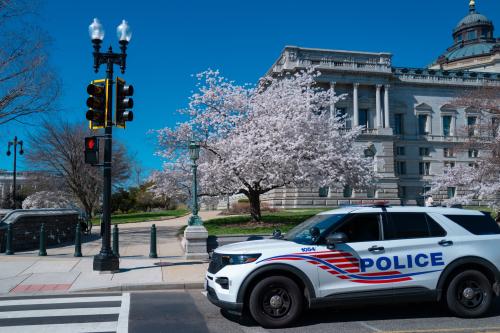On Feb. 11, 2020, Rashawn Ray, a David M. Rubenstein Fellow at The Brookings Institution, testified before the Maryland state Senate’s Judicial Proceedings Committee (Senate Bill 606) and the House of Delegates’ Judiciary Committee (House Bill 917) in regards to the 2nd Lt. Richard W. Collings III Law. Collins III, who is Black, was murdered by Sean Urbanski, who is white, on the campus of University of Maryland in College Park in 2017. Ray used his testimony to address what we know about hate crimes over time, who are the main victims and perpetrators of hate crimes, and what states and the country should do about the rise of hate crimes in the United States. This bill, aimed to strengthen hate crime laws in the state of Maryland, passed in both the Maryland state Senate and the House of Delegates in the Maryland General Assembly in March 2020.
Using data from the Department of Justice, Southern Poverty Law Center, and the Anti-Defamation League, Ray highlighted the following observations:
- The rise of hate groups and the increase in hate crimes in the United States is an epidemic. A hate crime incident occurs every hour in the United States. From 1999 to 2018, the number of hate groups in the United States increased 123% from 457 to 1,020. In places where Donald Trump campaigned in 2016, hate crimes increased over 200%.
- From 2008 through 2017, nearly three in four murders classified as domestic terrorism were committed by right-wing extremists (most of whom were white nationalists). Twenty-six percent was committed by left-wing extremism (such as anarchists or Black nationalists) and only 3% was committed by Islamic extremists.
- The weakness of current hate crime legislation limits law enforcement’s and prosecutors’ abilities to classify white extremist attacks as hate crimes because current law does not identify these incidents as domestic terrorism. Thus, these events become classified as isolated, individual incidents rather than a collective pattern of domestic terrorism.
Ray concluded his testimony by asserting that a particular clause in The 2nd Lieutenant Richard W. Collins III Law—“motivated … in part”—is vitally important. As a scholar who studies attitudes and behaviors, Ray noted that rarely is anyone’s decision solely based on one factor. Yet, only for racism does America seem to set the bar of culpability so high. Ray argues this important change in language will give law enforcement and prosecutors the tools to pursue domestic terrorism charges related to hate crimes in the United States.
To read his full testimony, click here. To see full video of Ray’s testimony and the bill hearing, click here; see below for a clip of Ray’s testimony:
In March, The @2LtRWCFound Law passed in the state of Maryland. I was honored to testify on this bill. It allows for law enforcement & prosecutors to bring forth hate crime charges if the act was “motivated in part” due to a protected status like race or religion.@BrookingsGov pic.twitter.com/4sXz2H7CR5
— Dr. Rashawn Ray (@SociologistRay) March 30, 2020
The Brookings Institution is committed to quality, independence, and impact.
We are supported by a diverse array of funders. In line with our values and policies, each Brookings publication represents the sole views of its author(s).




Commentary
TestimonyAddressing hate crimes in Maryland and in America
April 7, 2020